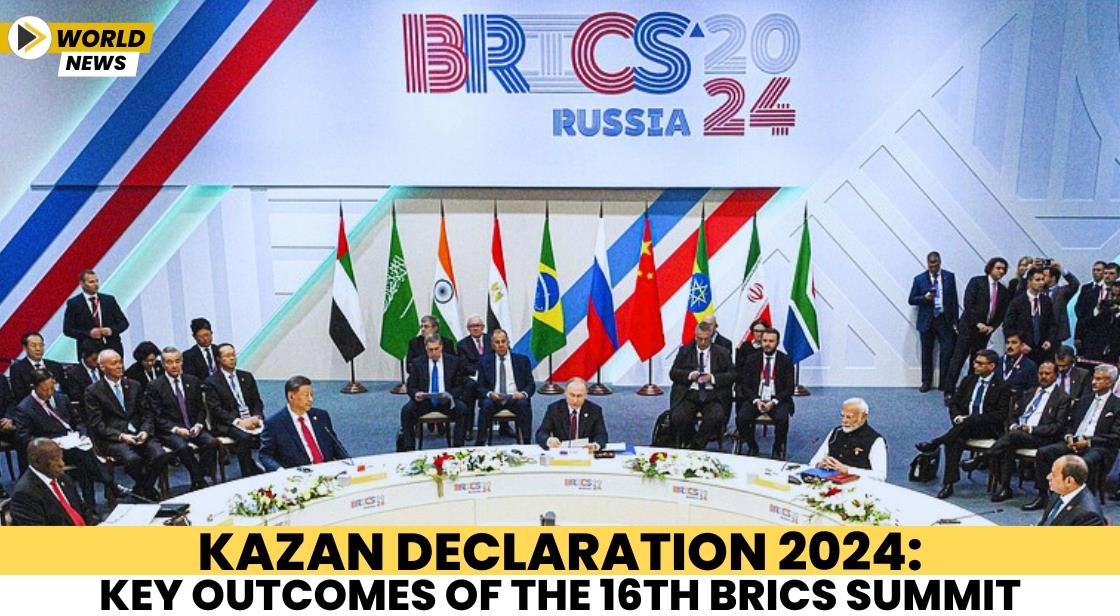Kazan Declaration 2024: Key Outcomes of the 16th BRICS Summit

News Synopsis
The 16th BRICS Summit in Kazan, Russia, concluded with the adoption of the Kazan Declaration, a comprehensive document outlining the bloc's vision for global cooperation and addressing key international challenges. The summit brought together leaders from BRICS nations and other countries, reaffirming the bloc's commitment to strengthening multilateralism and addressing the concerns of the Global South.
Key Highlights of the Kazan Declaration
Geopolitical Concerns and International Conflicts
A major focus of the Kazan Declaration was addressing ongoing international conflicts through diplomatic and peaceful resolutions. The leaders reaffirmed their dedication to adhering to the United Nations Charter and welcomed mediation efforts in conflicts such as the one in Ukraine.
Geopolitical Concerns
-
Ukraine Conflict: The declaration expressed support for a peaceful resolution of the Ukraine conflict through dialogue and diplomacy.
-
Middle East Crisis: The leaders expressed grave concern over the escalating humanitarian crisis in the Middle East, particularly in Palestine and Lebanon.
-
Global Governance and Multilateralism
-
G20 Role: The summit underscored the importance of the G20 in global decision-making.
-
Financial Architecture Reform: BRICS nations reiterated their commitment to reforming the international financial architecture to make it more agile, responsive, and representative.
-
Financial Innovation: The leaders encouraged new financial practices and supported initiatives such as the BRICS Interbank Cooperation Mechanism (ICM) and the BRICS Grain Exchange.
-
International Monetary Fund: BRICS countries also stressed their support for maintaining a robust and well-resourced International Monetary Fund (IMF) and urged the development of innovative financial practices through the BRICS Interbank Cooperation Mechanism.
-
Economic Cooperation and Local Currencies
-
Cross-Border Payments: The summit welcomed the use of local currencies in BRICS financial transactions and supported the exploration of an independent cross-border settlement infrastructure.
-
BRICS Grain Exchange: The establishment of a BRICS-based grain exchange was welcomed.
-
BRICS Plus Partnership: The leaders endorsed the creation of a BRICS Partner Country category, welcoming new member countries.
Pandemic Preparedness and Environmental Conservation
-
Health Initiatives: The summit emphasized the importance of strengthening health systems and addressing antimicrobial resistance.
-
Big Cats: The leaders pledged to collaborate on preserving endangered species, recognizing India's initiative to create an International Big Cats Alliance.
The Kazan Declaration also placed significant focus on global health and environmental conservation. The leaders pledged to strengthen health systems and pandemic preparedness through collaboration, particularly emphasizing the importance of the BRICS R&D Vaccine Center and the development of an Integrated Early Warning System for infectious disease prevention.
The declaration recognized the urgent need to combat antimicrobial resistance (AMR) and praised the outcomes of the 79th United Nations General Assembly High-Level Meeting on AMR. Moreover, India’s initiative to create an International Big Cats Alliance was acknowledged, as BRICS leaders vowed to enhance collaboration on the preservation of endangered species.
Conclusion
The 16th BRICS Summit in Kazan stands as a pivotal moment in the bloc's history, reinforcing its mission to reshape global governance and ensure that the voices of emerging economies and developing nations are heard on the world stage. The Kazan Declaration not only articulates BRICS' unified vision for a more just and equitable international order but also marks a significant step towards addressing some of the most pressing global issues of our time.
One of the summit's standout achievements was its unwavering focus on fostering diplomacy and peaceful resolutions in international conflicts. The declaration's call for dialogue and diplomacy in the Ukraine conflict and the escalating humanitarian crises in Palestine and Lebanon demonstrates BRICS' commitment to resolving disputes in accordance with the principles of the United Nations Charter. This highlights the bloc's role as a key proponent of multilateralism, emphasizing that collective efforts are essential for peace and security worldwide.
In the realm of global governance, BRICS leaders stressed the need for a more agile, representative, and responsive international financial architecture. By advocating for reforms in global financial institutions such as the International Monetary Fund (IMF) and fostering financial innovation through mechanisms like the BRICS Interbank Cooperation Mechanism (ICM), the summit solidified its agenda for financial inclusivity and sustainable economic growth.
Furthermore, the emphasis on cross-border payments in local currencies and the potential establishment of a BRICS Grain Exchange underscore the bloc’s ambition to strengthen its economic cooperation and reduce reliance on existing global financial systems.
The inclusion of new nations into the BRICS Plus Partnership, as well as initiatives aimed at expanding the bloc's influence in the Global South, further bolsters BRICS’ capacity to serve as a representative for developing nations.
The acceptance of countries like Egypt, Ethiopia, Iran, Saudi Arabia, and the UAE highlights the bloc’s growing geopolitical influence and its desire to create a more inclusive and equitable global framework.
In addition to economic and geopolitical issues, the Kazan Declaration demonstrated a strong commitment to pandemic preparedness and environmental conservation. The summit recognized the importance of strengthening health systems, tackling antimicrobial resistance (AMR), and advancing collaboration on vaccine research and infectious disease prevention.
Initiatives such as the BRICS R&D Vaccine Center and the Integrated Early Warning System reflect BRICS' forward-looking approach to safeguarding global health security. Moreover, the summit's endorsement of India’s initiative to create an International Big Cats Alliance highlights the bloc's dedication to environmental conservation, specifically focusing on preserving endangered species.
You May Like









